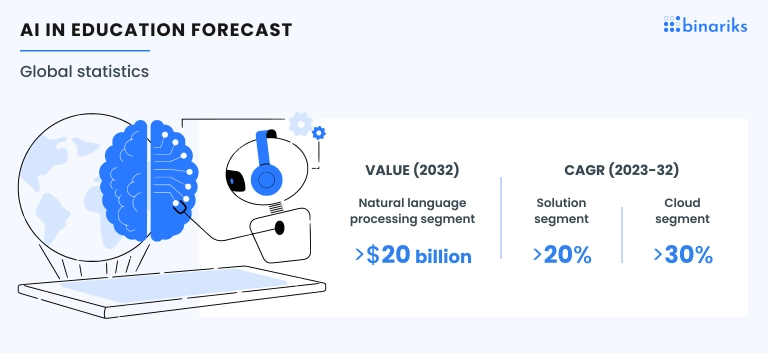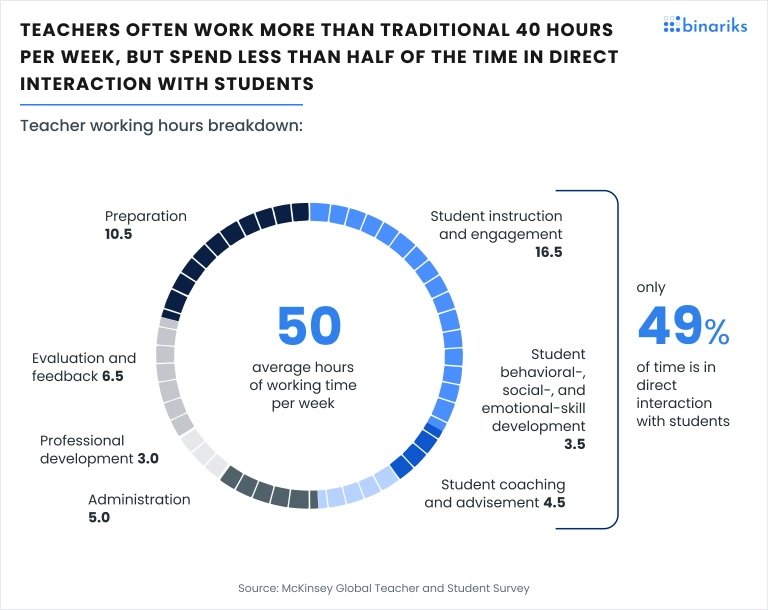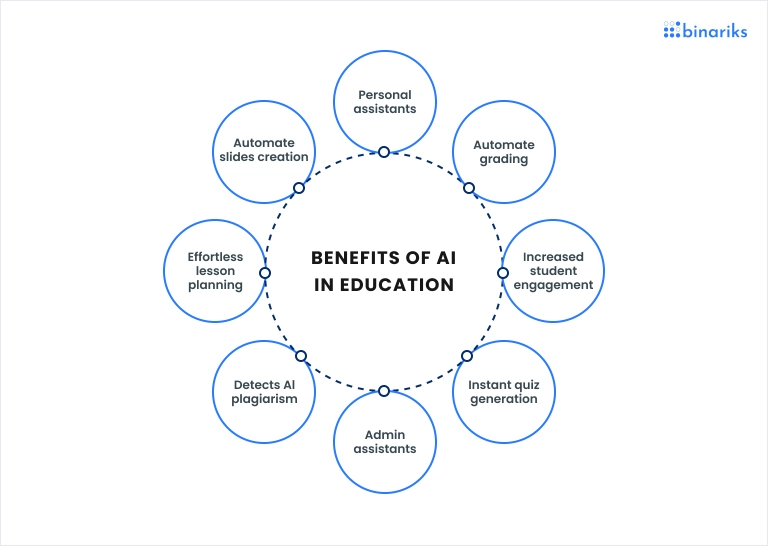Content
Show content
In the modern educational landscape, eLearning and integrating of AI tools in eLearning specifically are revolutionizing how educational content can be delivered and consumed.
AI tools are becoming increasingly indispensable. They offer personalized learning experiences, automate administrative tasks , and enhance the efficiency and effectiveness of eLearning apps and platforms.
Join us as we will explore the transformative power of AI in the realm of elearning, delving into the statistics and benefits, addressing common challenges, and showcasing how AI technologies can be leveraged to elevate the educational landscape.
AI in modern eLearning: stats & benefits

The use of AI in eLearning is not just a trend but a powerful shift reshaping education. This transformation is backed by compelling statistics and forecasts that highlight its growth and potential:
- A recent study predicts that the global AI in the education market is set to grow at CAGR over 45% between 2023 and 2027, reflecting an increasing adoption rate across the US and Europe (Source ).
- In the US, 60% of educational institutions have already integrated some form of AI to support both teaching and learning processes (Source ).
- Based on end-user, higher education has the largest market share, and its growth is expected to remain significant during 2024-2027 (Source ).
- Based on application, AI-enabled learning platforms and virtual assistants/facilitators lead, with a revenue share of about 45% (Source ).
The advantages of artificial intelligence in eLearning are vast, offering:
- Personalized learning experiences: AI algorithms can tailor content to meet individual student needs, improving engagement and outcomes.
- Efficiency in administration: Automation of tasks like grading and scheduling frees up educators to focus on teaching.
- Enhanced accessibility: AI-powered tools make learning materials accessible to students with disabilities, breaking down barriers in education.

These statistics and benefits underscore how AI is transforming the eLearning industry, promising a future where education is more personalized, efficient, and inclusive.
Elevate your educational impact: Start building smarter with our custom software development services! Read more
How AI solves eLearning challenges
Grading and assessment
One of the most time-consuming tasks for educators is grading. The use of AI in eLearning revolutionizes this process by automating assessments, allowing for instant feedback and more time for educators to focus on teaching rather than administrative tasks.
AI algorithms can accurately grade quizzes and written responses, significantly improving efficiency and performance evaluation.
Chatbots for support
AI-powered chatbots are transforming customer support and student interaction. They provide immediate responses to repetitive questions, available 24/7, ensuring learners and customers receive the help they need anytime. This not only enhances the learning experience but also reduces the workload on human support staff.
Innovative payment solutions
AI integration into eLearning platforms or mobile apps includes advanced payment tools that streamline the subscription and payment processes. These tools automate billing, detect fraud, and personalize payment plans for students, improving the overall customer experience.
Content creation
Creating engaging and personalized content for an eLearning course can be daunting. AI-based elearning tools assist in generating educational content , making it easier to develop courses tailored to various learning styles and needs. This leads to more effective training programs and better learner engagement.
Personalizing the learning process
AI excels at personalizing education. By analyzing data on learner performance and preferences, AI can adjust the difficulty level of tasks, recommend additional resources, and even predict which students may need extra help, making the education process more effective.
Engagement and motivation
Keeping students engaged and motivated is a common challenge. AI-driven gamification and microlearning techniques make learning more interactive and fun. AI can also send personalized reminders and encouragement, helping learners stay on track.
By addressing these challenges, AI not only enhances the eLearning experience but also opens up new possibilities for both educators and students, making education more accessible, personalized, and efficient.

4 examples of AI tools for eLearning
The use of AI in eLearning has given rise to various innovative tools that significantly enhance the learning and teaching process. Here are several noteworthy examples that are making a real difference:
1. Duolingo
A popular AI learning platform that leverages AI to offer personalized language learning experiences. It adapts its lessons based on the learner's performance, ensuring content is always challenging yet achievable. Duolingo's use of AI facilitates more effective language acquisition, making it a favorite among students worldwide.
2. Grammarly
This AI-based tool improves writing skills by providing real-time grammar, punctuation, and style suggestions. It's an invaluable asset for students and professionals alike, enhancing their ability to communicate clearly and effectively.
3. Coursera
Utilizing AI for personalized learning paths, Coursera offers a wide range of courses that adapt to the learner's pace and understanding. AI algorithms suggest courses and materials based on the learner's interests and past learning behavior, optimizing the educational journey.
4. Quizlet
Known for its AI-powered study tools, Quizlet uses machine learning to create customized study sets and practice tests that match the learning needs of each student. This approach helps improve study efficiency and knowledge retention.
These tools illustrate the integration of AI into eLearning, solving real-life educational challenges such as language barriers, writing proficiency, course selection, and efficient studying. Each product offers a glimpse into how AI is transforming the eLearning industry by making education more accessible, personalized, and engaging.
Take your software to new heights with tailored AI/ML solutions Read more
How to choose the right AI tool for your eLearning product
Selecting the ideal eLearning AI tool requires careful consideration of several key factors to ensure it meets your educational goals and integrates seamlessly into your existing systems. Here are some crucial aspects to consider:
- Define your goals: Understand what you aim to achieve with AI in your eLearning environment. Whether it's enhancing learner engagement, personalizing content, or automating administrative tasks, your goals will guide your choice.
- Integration capabilities: Choose an AI tool that easily integrates with your current eLearning platform and software ecosystem. Seamless integration ensures a smooth user experience for both instructors and learners.
- Customization and scalability: Look for AI tools that offer customization options to tailor the learning experience to your specific needs. Additionally, consider the tool's scalability feature to accommodate growing numbers of users and evolving learning requirements.
- Data privacy and security: This one is paramount. Ensure the AI tool complies with data protection regulations like GDPR in Europe or CCPA in the US. It should have robust security measures to safeguard learners' information.
- User support and training: Adequate support and training resources are essential for a smooth implementation and usage. The availability of expert assistance and user guides can significantly enhance your experience with the AI tool.
By focusing on these factors, educators and institutions can make informed decisions when choosing the right AI tool for their eLearning programs, ensuring they leverage technology that not only enhances learning outcomes but also aligns with their educational ethos and compliance requirements.
Binariks experience
Binariks helps businesses across industries implement AI solutions to improve their results and maximize digital transformation benefits.
One of our projects related to the education industry is a Blockchain-backed platform for verifying educational certificates. We've formed a team including an architect, backend and frontend developers, QAs, UI/UX designers, and a project manager to craft a web platform architecture that meets technical standards for edtech .
However, while our experience in the education sector is growing, we excel in custom software product development , including web and mobile app development , providing tailored AI and ML services, big data, and analytics — key technologies for edtech.
Due to our solid expertise in rigorously regulated and sensitive domains like healthcare or fintech, we have a deep understanding of AI regulations and regulations that protect personal data, like GDPR. Thus, we can ensure that the solutions we create meet the highest data privacy and security standards.
We provided an MVP incorporating functionalities of the blockchain-powered edutech platform Read more An app for digital badge issuance and verification
Final thoughts
Integrating artificial intelligence into eLearning is more than a technological advancement. It is a paradigm shift in the educational landscape.
Despite some understandable risks and challenges of implementing AI, many AI tools are already successfully paving the way for innovative solutions that address these hurdles, making education more accessible and engaging for all. As we move forward, it is clear that AI will continue to transform the eLearning industry. And you do not want to miss this opportunity for your edtech company.
Contact Binariks today to learn how we can help you create tailored AI/ML solutions and stay at the forefront of this exciting journey.
Share

